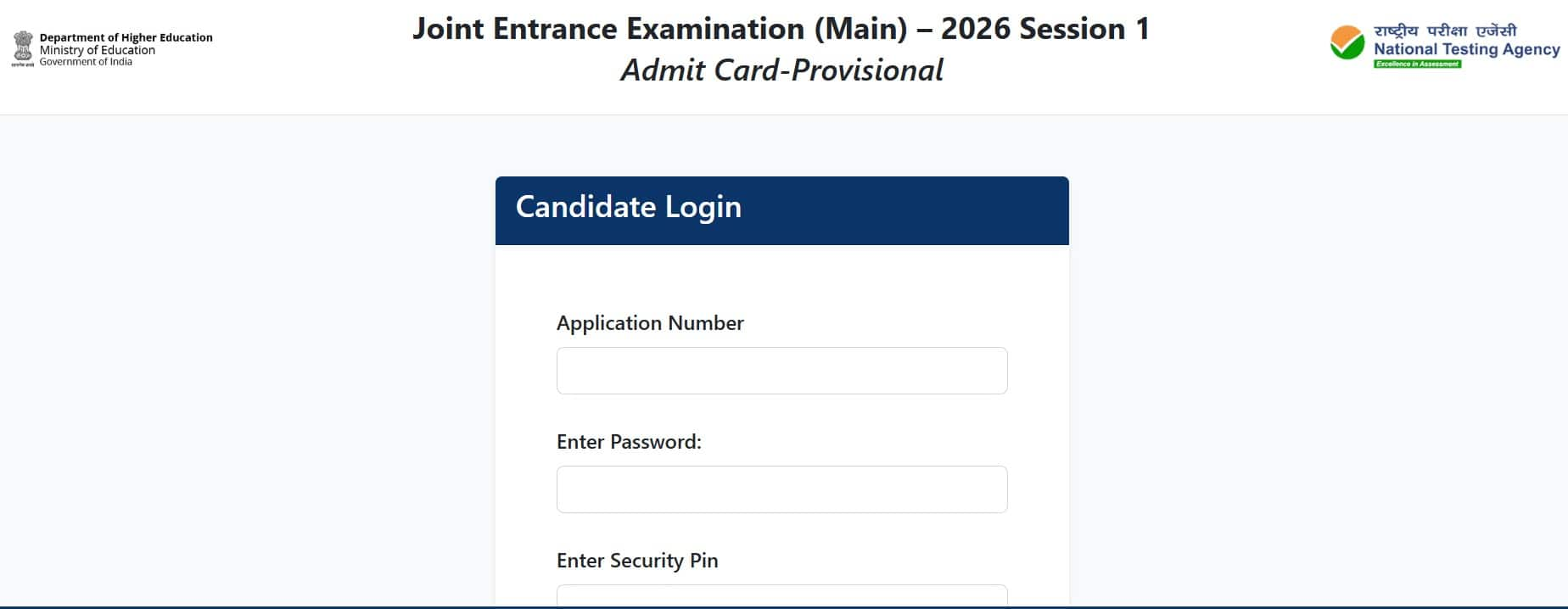Amity University-Noida B.Tech Admissions 2026
Among top 100 Universities Globally in the Times Higher Education (THE) Interdisciplinary Science Rankings 2026
JEE Main Preparation Tips 2026: Cracking any competitive exam requires proper strategy and planning. So, We are here with the preparation tips and tricks for JEE Mains 2026. Due to the high competition of the JEE Main exam, it is important to plan and strategize properly. We will see exam pattern, important books and a lot of other resources. All of this will help you to start your JEE Main 2026 exam preparation.
The NTA published the JEE Mains admit card 2026 for session 1 exams in the afternoon. It has hosted two official links on the portal, jeemain.nta.nic.in. However, both the JEE admit card links were not working for some time, likely due to heavy traffic on NTA website. Currently, the first link uploaded by the NTA is active. Candidates can view and download their hall tickets using their registration number, password, and captcha code.
 JEE Main 2026 provisional admit card download link. (Source: jeemain.nta.nic.in)
JEE Main 2026 provisional admit card download link. (Source: jeemain.nta.nic.in)
This Story also Contains

In this article, students will learn about preparation strategies and useful tricks to solve questions. By following a structured study plan and consistent practice, students can improve their speed, accuracy, and confidence. With the right approach, even complex problems can be solved efficiently, helping you maximize your score in the exam.
Also read:
To ensure your best preparation for JEE Mains, some important preparation tips are provided below:
Check JEE Main Syllabus
Before starting their JEE Main preparation journey, students should go through the JEE Main Latest Syllabus 2026 and understand it completely for planning their preparation.
Maintaining Notes
Maintaining good notes is one of the most important habits for effective JEE Main 2026 preparation. Well-organized notes save time during revision, strengthen concepts, and improve memory retention. These notes will be useful for quick revision before mock tests and exams.
Focus on the NCERT Textbook
Focusing on the NCERT textbook is one of the smartest strategies for JEE Main 2026 preparation, especially for Chemistry. Many toppers and coaching experts agree that NCERT is the backbone of JEE—but it must be used the right way.
Divide Your Study Time
Dividing your study time smartly to balance time for each subject. Time division is important to prevent over-focusing on one topic and to maintain daily consistency. If you study 10 hours daily for your preparation then divide your time as given in the table:
| Subject | Time |
| Physics | 3 hours |
| Chemistry | 2.5 hours |
| Mathematics | 3 hours |
| Mock Test + Analysis | 1.5 hours |
Create a Revision JEE strategy
A well-planned revision strategy is essential for cracking JEE Main 2026. The first step in an effective revision plan is to divide your preparation into systematic phases. Start with a Concept Revision Phase where you go through your class notes, NCERT textbooks, and important theory again to strengthen your basics. Then move to the Practice and PYQ Phase, where you start solving topic-wise questions and previous year papers from 2019 to 2025. Then practice Mock test paper.
Organizing And Planning Your Study
Create a timetable, both daily and monthly, to keep your studying on track. Make sure to set specific time aside to dedicate to learning, practice, review, and mock test. According to your structure, studying will allow sufficient time for learning and relieve anxiety that usually increases with time if not prepared properly.
Be Conceptual, Not Just Memorizing
Recognized as Institute of Eminence by Govt. of India | NAAC ‘A++’ Grade | Upto 75% Scholarships | Application Deadline: 15th Jan
100% Placement Record | Highest CTC 54 LPA | NAAC A++ Accredited | Ranked #62 in India by NIRF Ranking 2025 | JEE & JET Scores Accepted
Try to build strong understandings of Physics, Chemistry, and Maths. Solve application problems on a regular basis to understand what a formula really means - do not memorize formulas just to apply. It will help to remember them in the future. Conceptual learning improves your understanding of both the questions and application.
Practice the Last 10 Years of JEE Main Papers
Although, topic-wise questions and numerical problems should be solved on a daily basis, you should not forget to practice the last 10 years JEE Main papers. Being practiced and familiar with JEE Main papers will greatly improve your speed, accuracy, and confidence in the exam.
Take A Mock Test, Use An Error Note Book
Take a full length mock test every week while simulating test conditions as accurately as possible. Give yourself an hour to review errors by taking notes, and later identify the most troubling areas to review immediately following testing. It is necessary to be studying and revisiting these areas at all times to move forward.
Revision and Time Management
Have short notes and the formula handy for quick review prior to taking the test. Make it a practice to review these materials regularly. Particularly at the last weeks of prep, practice solving questions within test allotted time, then practice more questions providing an hour less than the allotted time.
We have provided the study plan to start preparing for the exam. It will help to plan daily study schedule properly. Check it below:
Time | Activity | Purpose |
6:00 AM – 7:00 AM | Light revision / formula review | Quick recall of important notes or formulas; start the day fresh |
7:00 AM – 8:30 AM | Focused study session 1 | Practice problems or concept reinforcement |
8:30 AM – 9:00 AM | Break | Relax, breakfast, short walk |
9:00 AM – 10:30 AM | Focused study session 2 | Solve previous year questions or sectional exercises |
10:30 AM – 11:00 AM | Short break | Tea/refresh |
11:00 AM – 12:30 PM | Focused study session 3 | Practice mock test section or numerical questions |
12:30 PM – 1:30 PM | Lunch / Rest | Take a complete break |
1:30 PM – 3:00 PM | Revision / Notes | Revise formulas, short notes, key mistakes from previous tests |
3:00 PM – 3:30 PM | Break | Tea/snack, relax |
3:30 PM – 5:00 PM | Take timed mini-tests or full section of previous papers | |
5:00 PM – 5:30 PM | Break | Short walk or refresh |
5:30 PM – 7:00 PM | Problem-solving / Weak area focus | Work on mistakes or difficult questions |
7:00 PM – 7:30 PM | Break | Dinner prep / light activity |
7:30 PM – 9:00 PM | Revision / Formula notebook | Recap what was studied today, update error notebook |
9:00 PM – 9:30 PM | Light reading / Relax | Optional: motivational reading, mental relaxation |
10:00 PM | Sleep | Ensure proper rest for memory consolidation |
Before starting the preparation, it is important to know the exam pattern of JEE Main. Here you can check it:
Particulars | Details |
Exam Name | Joint Entrance Examination (JEE) Main 2026 |
Conducting Body | National Testing Agency (NTA) |
Exam Level | National Level |
Exam Mode | Online (Computer-Based Test) |
Paper | Paper 1 – B.E./B.Tech |
Subjects | Physics, Chemistry, Mathematics |
Type of Questions | Multiple Choice Questions (MCQs) and Numerical Value Type (NVT) Questions |
Questions to Attempt | 75 (25 per subject), - Section A: MCQs (20 questions) - Section B: NVT (5 questions) |
Duration | 3 hours (180 minutes) |
Total Marks | 300 marks |
Marking Scheme | MCQs: +4 / −1; Numerical: +4 / 0 (no negative marking) |
Number of Sessions | Twice a year (Expected: January & April) |
Language of Exam | English, Hindi, and other regional languages (as per NTA guidelines) |
Eligibility Criteria | Passed/appearing in Class 12 (with Physics, Chemistry, and Mathematics) |
Official Website |
Also check:
Here, we have provided a list of best books for JEE Main 2026 preparation. You can refer it and start preparing accordingly:
Subject | Books | Purpose / Notes |
Physics | Concepts of Physics (Vol. 1 & 2) – H.C. Verma | Build strong fundamentals and problem-solving skills |
Problems in Physics – S.S. Krotov | Practice challenging and analytical problems | |
Chemistry (Organic) | Organic Chemistry – O.P. Tandon | Clear concepts and essential practice |
Organic Chemistry – Morrison & Boyd | Understand reaction mechanisms and advanced concepts | |
Chemistry (Physical) | Problems in Physical Chemistry – Narendra Awasthi | Practice numerical and problem-solving skills |
Concepts of Physical Chemistry – P. Bahadur | Comprehensive coverage for all topics | |
Chemistry (Inorganic) | Concise Inorganic Chemistry – J.D. Lee | Structured content for easy understanding |
NCERT Chemistry Class 11 & 12 | Foundation and core concept clarity | |
Higher Algebra – Hall & Knight | Strong algebra practice and techniques | |
IIT Mathematics – M.L. Khanna | Comprehensive problem practice | |
Problems in Calculus of One Variable – I.A. Maron | Master calculus concepts and applications | |
Trigonometry – S.L. Loney | Deep understanding of trigonometry |
Also Read:
Frequently Asked Questions (FAQs)
As per the exam analysis, the JEE Main 2026 will be moderate to difficult, leaning on the difficult side.
Candidates must have a proper preparation strategy based on the JEE Main exam syllabus and paper pattern. To prepare for the exam, candidates must gather resources such as books, study materials, previous year questions, mock tests, and much more.
Candidates can crack the JEE Main 2026 with proper preparation strategy, practice, complete revision, and practicing mock test.
On Question asked by student community
Hello aspirant,
With a 90 percentile in JEE Mains and belonging to the EWS category, you have a decent chance for some IIITs, especially newer or lower-ranked ones like IIIT Pune, Nagpur, Vadodara, or Lucknow, or non-CSE branches in better IIITs, but getting top IIITs (like IIIT Hyderabad/Delhi) or core
Hello,
Yes, attendance is compulsory in Class XI and XII.
As per school and board rules, students must maintain minimum attendance, usually around 75%. Schools can stop students from appearing in board exams if attendance is short.
Even if a student is preparing for JEE or any other competitive exam
Hello,
You can find here the direct links to download the JEE Main last 10 years PYQ PDFs from the Official Careers360 website.
Kindly visit this link to access the question papers : Last 10 Years JEE Main Question Papers with Solutions PDF
Hope it helps !
Hello Harika,
Firstly, you cannot prepare for JEE in 8 days if you havent studied before. But still, You can try solving the previous year question papers. Here's a Link for the same
HELLO,
If you are from General category with 57 percent in 12th then to appear for JEE Advanced you need to be in top percentile of your board as the eligibility for JEE advanced you need at least 75 percent in 12th or in the top 20 percentile of your
Among top 100 Universities Globally in the Times Higher Education (THE) Interdisciplinary Science Rankings 2026
National level exam conducted by VIT University, Vellore | Ranked #16 by NIRF for Engg. | NAAC A++ Accredited
Recognized as Institute of Eminence by Govt. of India | NAAC ‘A++’ Grade | Upto 75% Scholarships | Application Deadline: 15th Jan
Ranked #43 among Engineering colleges in India by NIRF | Highest Package 1.3 CR , 100% Placements
100% Placement Record | Highest CTC 54 LPA | NAAC A++ Accredited | Ranked #62 in India by NIRF Ranking 2025 | JEE & JET Scores Accepted
World-class and highly qualified engineering faculty. High-quality global education at an affordable cost